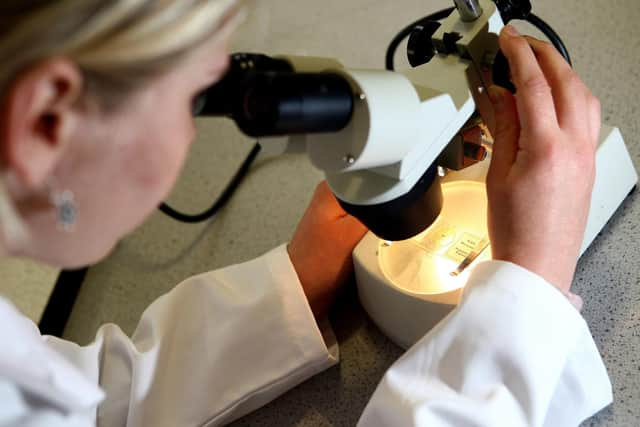Medical cannabis used to treat brain tumours during ‘world first trial’ in Leeds
Researchers have just recruited their first patient who will receive an oral spray, containing the cannabinoid-based drug nabiximols.
During the second phase of the trial, which is funded by The Brain Tumour Charity, researchers will aim to find out whether combining the drug and chemotherapy can extend the lives of people diagnosed with recurrent glioblastoma.
Advertisement
Hide AdAdvertisement
Hide AdIt is the most aggressive form of brain cancer and when it recurres patients survive for an average of just 10 months.


The trial, which is known as ARISTOCRAT and being led by Professor Susan Short from University of Leeds, will recruit more than 230 glioblastoma patients at 14 NHS hospitals across England, Scotland and Wales this year.
Professor Short said laboratory studies have shown that cannabinoids may slow the growth of glioblastoma tumours.
And during the first phase, researchers found that 27 patients with recurrent glioblastoma could tolerate nabiximols and chemotherapy, and the combination had the potential to extend their lives.
Advertisement
Hide AdAdvertisement
Hide Ad“We now have the opportunity to take these laboratory results, and those from the phase one trial and investigate whether this drug could help glioblastoma patients live longer in this first-of-a-kind randomised clinical trial,” said Professor Short.
Nabiximols contains a number of cannabinoids – the group of substances found in the cannabis plant – including tetrahydrocannabinol (THC) and Cannabidiol (CBD).
While THC can cause a person to feel high, CBD does not.
Dr David Jenkinson, Chief Scientific Officer at The Brain Tumour Charity, people who have made donations to support the trial, including Olympic champion Tom Daley who raised £450,000 two years ago.
“We are really excited that this world-first trial, being run here in the UK, could help accelerate a cure for this devastating disease,” he said.
Advertisement
Hide AdAdvertisement
Hide Ad“We hope that this will offer the first new drug to treat glioblastoma in over 15 years.
“In the meantime, while other cannabinoid-based products may help alleviate symptoms, there is insufficient evidence to recommend their use to help treat brain tumours.
“For anyone considering using cannabinoid-based products or other complementary therapies, it’s vital that you discuss these with your medical team first, as they could interact with other treatments such as anti-epileptic medicines or steroids.”
It comes as a separate study, conducted in Canada, found medicinal cannabis can safely and effectively relieve cancer pain and act as a treatment when conventional drugs fail.
Advertisement
Hide AdAdvertisement
Hide AdThe medications with an equal balance of THC and CBD were the most successful.
Researchers studied the treatment responses of 358 adults with cancer over a period of three-and-a-half years, between May 2015 and October 2018.